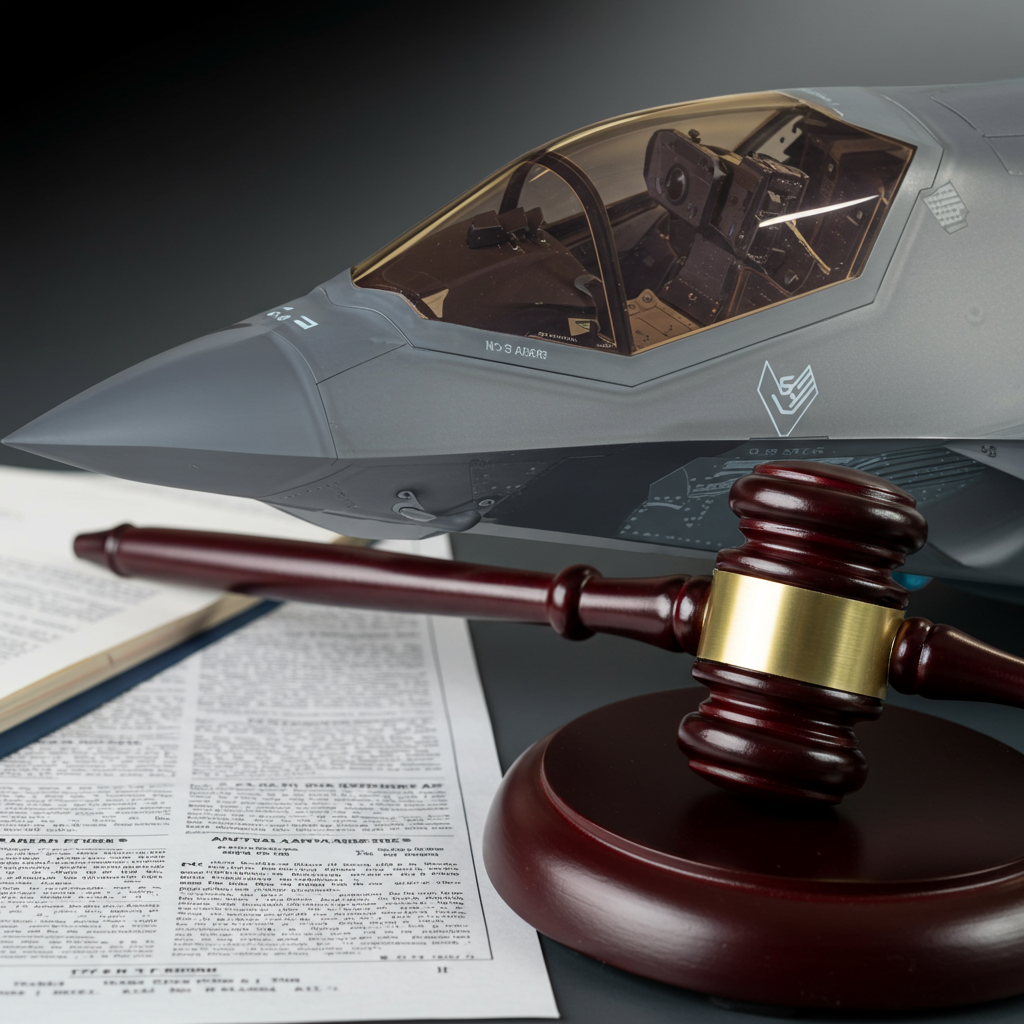Britain’s High Court has ruled that the government’s decision to continue allowing the export of components for Lockheed Martin F-35 fighter jets to Israel is entirely lawful. This pivotal decision, handed down on June 30, 2025, comes despite the court acknowledging the possibility that these UK-manufactured parts could be used in actions breaching international humanitarian law during the ongoing conflict in Gaza.
The judgment centers on a fundamental principle of the UK constitution: highly sensitive political and foreign policy matters are the responsibility of the executive branch, which is accountable to Parliament and the electorate, not the judiciary. This legal challenge underscores the complex intersection of international law, national defense strategy, and human rights advocacy amidst a devastating conflict.
The Legal Challenge Explained
The case was brought before the High Court by the Palestinian human rights organization Al-Haq, based in the occupied West Bank. They were joined by the UK-based Global Legal Action Network (GLAN) and supported by a coalition of international human rights groups including Oxfam, Human Rights Watch, and Amnesty International. The legal action was initiated as early as October 2023 or January 2025, following the intensification of the conflict in Gaza.
These organizations specifically challenged the UK government’s Department for Business and Trade (DBT). Their core argument was that the government’s decision to exempt F-35 jet parts from a partial suspension of arms export licenses, enacted in September 2023, was unlawful.
Al-Haq and its allies contended that allowing the continued export of these components posed a “significant risk of facilitating crime.” This referred specifically to potential serious violations of international humanitarian law (IHL) occurring in Gaza. They argued that under international obligations like the Arms Trade Treaty and the Genocide Convention, the UK is legally bound to cease such exports. Failure to do so, they claimed, threatens the global rule of law and risked making the UK complicit in potential war crimes.
Government Defence and Strategic Arguments
The UK government mounted a robust defense during the four-day hearing in May. Their primary argument rested on the constitutional separation of powers. They maintained that the decision on whether to permit the export of defense equipment, particularly within the context of complex international collaborations, is inherently a political matter. As such, it falls squarely within the domain of the executive, not the courts.
Government lawyers stated that the specific issue before the court was much narrower than the broader question of the conflict itself. It was, they argued, about whether the court could force the UK to withdraw from a crucial multilateral defense program simply because UK components might end up being used in potential IHL violations.
The F-35 Program Context
A key part of the government’s defense involved the structure of the F-35 Joint Strike Fighter program. This is a vast international collaboration where many nations contribute components. Britain plays a significant role, manufacturing approximately 15 percent of each F-35 jet. These parts, produced by at least 75 UK companies, range from complex rear fuselages and active interceptor systems to targeting lasers, tires, and ejector seats. The value of UK components in Israel’s F-35 fleet alone is estimated to exceed £500 million.
Crucially, the UK-made parts are not produced specifically for Israel. Instead, they go into a global supply chain and an international pool of spare parts accessible by all participating nations and authorized customers, including Israel.
The government argued that due to this global structure, it is not realistically possible for the UK to unilaterally prevent its specific components from reaching Israel’s F-35s without withdrawing entirely from the program.
The Court’s Reasoning and the “Non-Justiciable” Ruling
In their comprehensive 72-page ruling, Judges Stephen Males and Karen Steyn sided with the government. They dismissed all 13 grounds of challenge presented by the plaintiffs’ legal teams.
The judges emphasized that the decision regarding F-35 exports to Israel was an “acutely sensitive and political issue.” They firmly concluded that, under the UK constitution, such matters are properly the responsibility of the executive branch. This executive is accountable to Parliament and ultimately to the electorate, not the judiciary.
The ruling determined that the legality of continuing F-35 exports in this context was “non-justiciable,” meaning it is not a matter for the courts to decide. The court accepted the UK government’s argument that halting the export of these components would have a significant “knock on effect” on the entire international F-35 program. This would impact the global supply chain, affect NATO allies, and potentially even hinder countries like Ukraine’s ability to defend itself. The court accepted this argument as a valid strategic objective for the government.
Acknowledging Risk, Upholding Executive Power
Significantly, the High Court’s ruling did accept the possibility that the UK-manufactured F-35 parts could potentially be used by Israel in breach of international humanitarian law. However, they maintained that the decision on whether to continue exports despite this risk was a matter for the government, not the courts. The judges also noted that the grave risk to life in Gaza is not created by the F-35 carve-out and would not be removed by suspending the export of UK parts into the global program.
This aspect of the ruling has drawn particular criticism, highlighting the tension between the government’s acknowledged awareness of potential IHL violations and the court’s deference to executive power. The ruling implicitly protects ministers from judicial review based solely on international law obligations that have not been specifically incorporated into UK domestic law.
Revelations from the Case
The legal proceedings themselves brought to light details about the UK government’s internal assessments regarding Israel’s compliance with international humanitarian law in Gaza.
According to revelations from court pleadings, the government’s lawyers stated that the government had internally assessed in July 2024 that there was no serious risk of genocide occurring in Gaza. They also claimed not to have seen evidence of deliberate targeting of women and children.
Furthermore, the government’s evidential requirements for determining whether specific Israeli actions constituted a disproportionate attack – a key test under IHL – were described by critics as set at an “impossibly high” standard. By September 2024, after a high number of Palestinian casualties, the government had reportedly examined only 413 specific incidents. From this review, they found only one possible violation of international law – the attack on the World Central Kitchen aid convoy in April 2024. Crucially, they found zero possible breaches of IHL in any incident that resulted exclusively in Palestinian deaths.
Human rights groups argued that the government’s assessment methodology was flawed, focusing only on potential Israeli justifications for individual bombings rather than considering the overall pattern of harm to assess proportionality.
Reactions and Future Outlook
Predictably, the ruling was met with strong reactions from both sides. A UK government spokesperson welcomed the decision, stating it supported Britain’s contribution to the global F-35 spares pool, which they deemed vital for global security, particularly given the conflict in Europe. They reiterated the government’s commitment to continuing to review its licensing agreements.
For the human rights organizations that brought the case, the outcome was disappointing but not the end of their efforts. Shawan Jabarin, chief of Al-Haq, stated that despite the loss, the case had successfully centered the voice of the Palestinian people and rallied significant public support. He vowed to continue the fight for accountability and justice in the UK and internationally.
Critics argue that the judgment allows the UK government to prioritize political and economic interests over its legal and moral obligations to prevent complicity in potential war crimes. Yasmine Ahmed of Human Rights Watch commented that the judgment, through judicial deference, leaves Palestinians without the protections of international law despite the acknowledged risk of UK equipment being used in atrocities. Campaign Against Arms Trade (CAAT) called the judgment “cowardly,” suggesting it validates direct action against the arms trade.
The International Centre of Justice for Palestinians (ICJP) noted that the court accepted the government’s own findings that Israel is not committed to complying with IHL and that there is a clear risk of UK parts being used in serious violations. However, they criticized the court’s finding that the legality is “non-justiciable,” arguing that international laws are matters courts should rule on. ICJP stated their commitment to pursuing all legal avenues, including a potential appeal.
The ruling clarifies the UK High Court’s position on the limits of judicial intervention in sensitive foreign policy decisions. However, it also amplifies the calls for increased transparency and accountability regarding the UK’s arms export policies. The debate over the UK’s role in the global arms trade, particularly in the context of conflicts like Gaza, is far from over.
Frequently Asked Questions
Why did the UK High Court allow F-35 parts exports to Israel?
The High Court ruled that the decision is a matter for the UK government’s executive branch, not the courts. Judges stated that determining whether to withdraw from a critical international defense program due to the potential misuse of components is an “acutely sensitive and political issue.” They determined that such decisions fall outside the judiciary’s purview under the UK constitution, even while acknowledging the possibility that the parts could be used in breach of international humanitarian law.
Which organizations challenged the UK government’s decision?
The primary legal challenge was brought by the Palestinian human rights organization Al-Haq and the UK-based Global Legal Action Network (GLAN). They were supported by several other major international human rights groups, including Oxfam International, Human Rights Watch, and Amnesty International. Their lawsuit specifically targeted the UK’s Department for Business and Trade (DBT).
What are the key implications of this ruling on UK arms policy?
The ruling reinforces the principle that UK courts will defer to the executive branch on complex foreign policy and defense collaboration decisions, even when concerns about potential international law violations are raised. Critics argue this effectively shields the government from judicial scrutiny on these matters, allowing political and economic interests to potentially override human rights obligations. Advocates challenging arms exports vow to continue their efforts through political pressure, public campaigning, and potentially further legal challenges.
The High Court’s ruling upholds the UK government’s decision to continue exporting F-35 jet components to Israel. While acknowledging the potential risk that these parts could be used in violation of international humanitarian law, the court determined that the decision rests solely with the executive branch, not the judiciary. This judgment highlights the complex interplay between national security interests, international defense cooperation, and human rights concerns, leaving accountability for the controversial exports firmly with the government. Human rights organizations involved in the case have vowed to continue their efforts to challenge UK arms policy.




